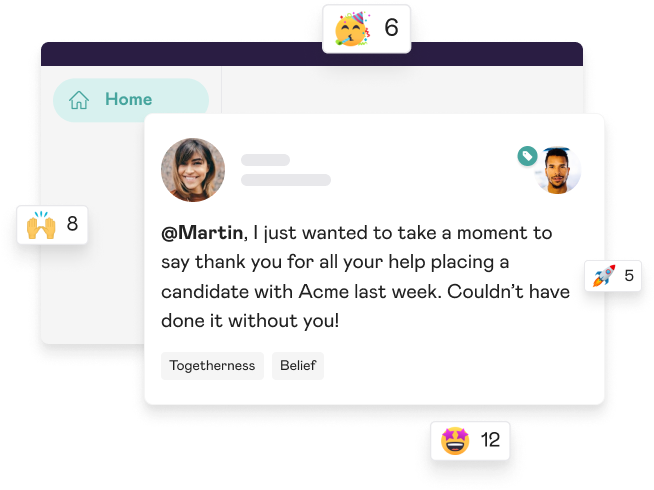We all want to be the best manager we can be, but how often have you sat back and wondered what that actually means? Being ‘good’ isn’t about acing every single assignment or making sure everyone likes you, it’s about supporting your team as you work together to achieve mutual objectives.
What makes a good manager?
A good manager is someone who’s able to balance all their competing priorities successfully. There’s no point being beloved by your team if you’re failing to hit company goals. And vice versa, there’s little benefit to smashing your targets in the short term, if you’re driving your employees away.
Being a good manager isn’t subscribing to one particular method or train of thought, it’s finding ways to make things work for everyone. A great manager can change the shape of a whole company. Check out our webinar on the crucial role of managers in shaping company culture.
“Management’s job is to convey leadership’s message in a compelling and inspiring way. Not just in meetings, but also by example.” – Jeffrey Gitomer Read, Author.
Problems new managers face
New managers face a unique set of challenges and problems which are present whether you’re new to a company or just new to the role. They include problems with:
1. Building connection
The connections you make with your team are the cornerstone of everything you do together and the better you are a building trust, the quicker those bonds will form.
2. Monitoring performance
When you’re fresh to a team and don’t know the ins and outs of everyone’s workload, it can be tricky to monitor performance efficiently.
3. Managing time
Helping your team manage their time and balance their workload is a top priority, but it isn’t easy when you don’t understand how long their various tasks take.
Problems current managers face
Managers who’ve been in a role for a while have a whole new set of problems to contend with, including things like:
1. Waning engagement
Demotivated staff and waning employee engagement is a massive warning sign for any manager – and sometimes it’s hard to spot until it’s almost too late.
2. Onboarding new staff
Whether you’re dealing with regular staff turnover or your team is small, the onboarding process can be as time consuming as it is challenging.
3. Internal movement
Ideally, you want your employees to be continually evolving and growing their skills. This is a positive thing, but internal promotion can cause headaches for managers too.
How to measure team performance
Measuring team performance is harder than it looks. Mainly because there are a lot of moving parts to consider. But with the right metrics and the right software to match, it’s much easier to stay up to date with your overall performance.
Engagement metrics
By keeping an eye on the kind of metrics that will show you how engaged your team is, you’ll be able to home in on the areas that need the most work. What kind of metrics do we mean? Things like:
- Retention, churn and recruitment rates
- Your Employee Net Promoter Score (eNPS)
- Communication and collaboration levels
- Employee satisfaction and engagement
Popular and effective engagement software
There’s plenty of software can help you keep an eye on your metrics, a few great options include:
Transform your culture with Mo

- Improve employee engagement scores
- Reduce employee churn
- Build a collaborative culture
What does a successful manager look like?
A successful manager is one who can work on both the macro and micro levels. Meaning, they can effectively and compassionately interact with their team on ma daily basis while also keeping the overall goals of the company in mind. There are several skills that can be developed to make this balancing act easier, including:
- Solid and clear communication
- Great attention to detail
- Active listening that prioritises employee experiences
- Strong strategic planning
- Thoughtful conflict resolution
How to support your priorities as a manager
Luckily, you’ll find there are also plenty of strategies you can key into when you’re looking to support your priorities. For example, an effective rewards and recognition scheme is an excellent way to help your team stay engaged as you work together for the greater good.
1. Rewards and incentives
A timely reward can make all the difference. And it doesn’t have to be an expensive gift or cash payment. In fact, things like recognition from a manager can actually be a lot more valuable to employees.
2. Mo offers more
At Mo, we see the value in offering a complete and holistic rewards and recognition platform that allows you to show your support for your team on every level. From Boosts to improve confidence to reminders that make sure you never miss a work anniversary, we can help you be a better manager.
3. Integration with Microsoft Teams
We know how important it is to be able to integrate your engagement tools with your existing environment. That’s why we released a new iteration of our Microsoft Teams integration in 2023. Use Mo without ever leaving your workflow, for maximum efficiency.
Case study: How Atlas Hotels supported management development with Mo
As the pandemic meant considerable disruption and lots of new managers, the Mo team worked with Atlas to educate and train managers on using Mo to facilitate better communication and recognition, as well as connect with their new teams.
🚀 Mo contributes to 17% decrease in employee turnover at Atlas Hotels
“Employee engagement and recognition unlock the guest experience for us, and it’s helpful that we have one home for our culture and recognition”.
Sarah Brocklebank, HR Director, Atlas Hotels
If you’re ready to build on your skills as a manager, why not find out how Mo can help? Our reward and recognition platform makes it easy for busy managers to meaningfully recognise, engage and connect with their teams.
We also equip you with ways to build healthy habits into everyday interactions, while offering you the sort of insight and supporting data that helps you make the right choices for your employees. Interested in seeing how our support can make a difference? Book a free demo.
The big benefits of effective management
Not only will you feel calmer and more in control when you’re managing effectively, but you’ll see a difference in performance too. Some of the most noticeable benefits include:
- Higher retention rates – staff are more likely to sti8ck around if they like and trust their manager.
- Strong employee development – upskilling your team not only helps you keep talent, it takes the pressure of recruitment off your HR team too.
- Increased employee engagement – a highly engaged workforce remains the gold standard, especially as Gallup reports an engagement rate of only 32%.
Here at Mo, we know that there are lots of different management styles, each with their own advantages and challenges. That’s why we create tools that make the everyday easier, helping you hone your management skills – whatever your style.




